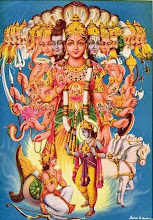 He declared totalitarian war against maya, illusion, including all other religious conceptions.
He declared totalitarian war against maya, illusion, including all other religious conceptions. In the culture of Gaudiya Vaishnavism, the subject of nationalism has been dealt with by such exalted personalities as Srila Bhaktisiddhanta Saraswati Thakur (pictured above). He manifested his earthly pastimes between the years 1874 and 1936. During that time, the Indian Nationalist movement was active in trying to defeat British rule. The Bengali, Subhas Chandra Bose was a prominent leader in that movement, and he was, it is reported, in conflict with Ghandi's non-violent resistance to the British colonialists. He advocated the use of armed resistance, and he allied with the Japanese and Nazi military in an attempt to chase the Brits out of India. Savitri Devi, although not Indian by birth was a proponent of Hinduism and National Socialism, which can be condensed as championing the Aryan culture as a model for social organization and spiritual guidance. The above mentioned personalities were active in their various fields before the Second World War. Savitri Devi eulogises the sadhus of Bengal in her writings. She also speaks in favour of varnashram dharma, the proscribed method for social organisation. Srila Bhaktisiddhanta Saraswati Thakur was active in Bengal and other parts of India in the thirties, and it is possible that Savitri Devi came in contact with members of Srila Bhaktisiddhanta's mission. Even if she didn't, she shows in her writings quite a deep understanding and appreciation of Indian culture.
In the culture of Gaudiya Vaishnavism, the subject of nationalism has been dealt with by such exalted personalities as Srila Bhaktisiddhanta Saraswati Thakur (pictured above). He manifested his earthly pastimes between the years 1874 and 1936. During that time, the Indian Nationalist movement was active in trying to defeat British rule. The Bengali, Subhas Chandra Bose was a prominent leader in that movement, and he was, it is reported, in conflict with Ghandi's non-violent resistance to the British colonialists. He advocated the use of armed resistance, and he allied with the Japanese and Nazi military in an attempt to chase the Brits out of India. Savitri Devi, although not Indian by birth was a proponent of Hinduism and National Socialism, which can be condensed as championing the Aryan culture as a model for social organization and spiritual guidance. The above mentioned personalities were active in their various fields before the Second World War. Savitri Devi eulogises the sadhus of Bengal in her writings. She also speaks in favour of varnashram dharma, the proscribed method for social organisation. Srila Bhaktisiddhanta Saraswati Thakur was active in Bengal and other parts of India in the thirties, and it is possible that Savitri Devi came in contact with members of Srila Bhaktisiddhanta's mission. Even if she didn't, she shows in her writings quite a deep understanding and appreciation of Indian culture.Someone familiar with the works and teachings of Srila Bhaktisiddhanta and his followers and disciples, will see in Savitri Devi a noble attempt at promoting the solution to the world's ills, namely the ancient and eternal Vedic culture, which due to the onset of Kali Yuga has been replaced by demoniac philosophies and religions.
So, what are the sadhus saying? What is the Bhagavad Gita, that many prominent persons in history have held up as so influential and important (including Savitri Devi and Ghandi), also saying?
Firstly, it is no good paying lip service to a Vaishnava sadhu as if they are just blowing hot air. What they are speaking of is crucial to everyone, in every walk of life. One subject discussed by Vaishnavas is the Bhagavad Gita, which contains the essence of spiritual instruction, viz-a-viz, surrender to the Supreme Lord.
The prominent disciple of Srila Bhaktisiddhanta Saraswati, Srila A C Bhaktivedanta Swami Prabhupada, who introduced Vaishnavism to the western world, was initially involved in the Indian campaign for independence. However, on meeting Srila Bhaktisiddhanta, he was advised to make the preaching of Vaishnavism the main focus of his life. Bodily concepts and selfish, parochial interests are illusions meant to trap the soul in bondage to this material world. So, therefore, concepts like my wife, my home, my nation etc are detrimental to progress in spiritual life. Of course, while we are here, a nation is to be run and maintained as is a family and home, but these should be viewed as temporary and therefore subordinate to our spiritual interest.
